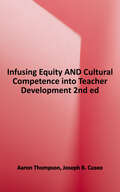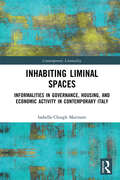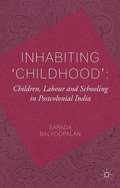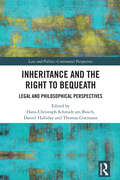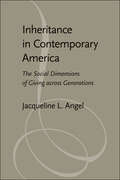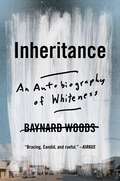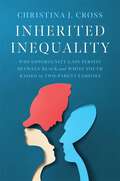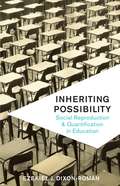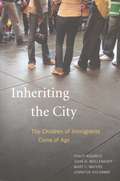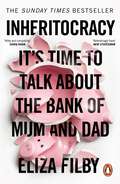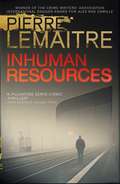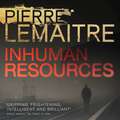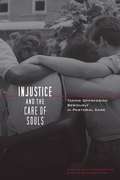- Table View
- List View
Infrastructuring Urban Futures: The Politics of Remaking Cities
by Alan Wiig, Kevin Ward, Theresa Enright, Mike Hodson, Hamil Pearsall and Jonathan SilverEPDF and EPUB available Open Access under CC-BY-NC-ND licence. Focusing on material and social forms of infrastructure, this edited collection draws on rich empirical details from cities across the global North and South. The book asks the reader to think through the different ways in which infrastructure comes to be present in cities and its co-constitutive relationships with urban inhabitants and wider processes of urbanization. Considering the climate emergency, economic transformation, public health crises and racialized inequality, the book argues that paying attention to infrastructures’ past, present and future allows us to understand and respond to the current urban condition.
Infusing Equity and Cultural Competence into Teacher Development
by Aaron Thompson Joseph B. CuseoAs teachers face increasing diversity within their classrooms in learning styles, race, linguistics, and culture, the academic rigor needed to successfully enter college or a career will require them to evolve in order for all students to succeed. <p><p> Infusing Diversity & Cultural Competence into Teacher Education provides educators and future educators with pathways for achieving cultural competence. Placing this crucial competence in the teacher’s toolbox will increase their opportunity and the capacity of ensuring success in and out of the classroom. The tools presented in this book assist the teacher in making gains in closing achievement gaps, building opportunity for all students, building strong pedagogical skills, enhancing curriculum for their diverse students, and constantly assessing all of these areas to ensure they are maintaining their status as the largest contributor to students’ success. <p><p> Infusing Diversity & Cultural Competence into Teacher Education: <p> Defines, describes, and explains why diversity should be part of the formal education process <p>Illustrates student, family, school, and community roles in the learning process. <p>Describes how to incorporate intercultural communication and relationship building skills into curriculum.
Ingenious Citizenship: Recrafting Democracy for Social Change
by Charles T. LeeIn Ingenious Citizenship Charles T. Lee centers the daily experiences and actions of migrant domestic workers, sex workers, transgender people, and suicide bombers in his rethinking of mainstream models of social change. Bridging cultural and political theory with analyses of film, literature, and ethnographic sources, Lee shows how these abject populations find ingenious and improvisational ways to disrupt and appropriate practices of liberal citizenship. When voting and other forms of civic engagement are unavailable or ineffective, the subversive acts of a domestic worker breaking a dish or a prostitute using the strategies and language of an entrepreneur challenge the accepted norms of political action. Taken to the extreme, a young Palestinian woman blowing herself up in a Jerusalem supermarket questions two of liberal citizenship's most cherished values: life and liberty. Using these examples to critically reinterpret political agency, citizenship practices, and social transformation, Lee reveals the limits of organizing change around a human rights discourse. Moreover, his subjects offer crucial lessons in how to turn even the worst conditions and the most unstable positions in society into footholds for transformative and democratic agency.
Ingenious Principles of Nature: Do We Reckon With Nature Or Nature Reckons With Us
by E. W. KüppersThis volume focuses on practical applications of the principles that can be transferred from nature to our design space. It is thereby supported by the regulation and control systems as described by the science of cybernetics.
Inhabiting Cyberspace and Emerging Cyberplaces
by Tobias BoosThis book explores the concept of cyberplace as a mode of inhabiting the contemporary world. As a result, it suggests that, for many communities, unlocking cyberspace and inhabiting cyberplaces is now an integral part of their coming-to-the-globalised-world. Boos reviews in the detail the existing academic literature from cultural anthropology, human geography, and sociology on "cyberspace", concluding that a phenomenological perspective on cyberspace provides the possibility of gaining a deep understanding of our contemporary lifeworlds, in which on- and offline practices constantly intermingle. In four chapters, he applies the developed theoretical and methodological approaches to the case of Siena's neighbourhoods, the contrade, analysing their websites and discussing the implications of his findings for understanding contemporary processes of community building and for future research on cyberspace. This concise and accessible book will be of interest to advanced students and scholars in cultural anthropology, human geography, media studies and sociology.
Inhabiting Liminal Spaces: Informalities in Governance, Housing, and Economic Activity in Contemporary Italy (Contemporary Liminality)
by Isabella Clough MarinaroThis book draws together debates from two burgeoning fields, liminality and informality studies, to analyze how dynamics of rule-bending take shape in Rome today. Adopting a multiscalar and transdisciplinary approach, it unpacks how gaps and contradictions in institutional rulemaking and application force many residents into protracted liminal states marked by intense vulnerability. By merging a political economy lens with ethnographic research in informal housing, illegal moneylending, unauthorized street-vending and waste collection, the author shows that informalities are not marginal or anomalous conditions, but an integral element of the city’s governance logics. Multiple actors together construct the local cultural norms, conventions and moral economies through which rule-negotiation occurs. However, these practices are ultimately unable to reconfigure historically rooted power dynamics and hierarchies. In fact, they often aggravate weak urbanites’ difficulties in accessing rights and services. A study that challenges assumptions that informalities are predominantly features of developing economies or limited to specific groups and sectors, this volume’s critical approach and innovative methodology will appeal to scholars of sociology and anthropology interested in social theory, urban studies and liminality.
Inhabiting Silence: An Anthropologist in the Cloister (European Anthropology in Translation)
by Francesca SbardellaMonasteries are typically characterized by physical and symbolic limitations on access as they are usually known through written texts and accounts by nuns who live in that world but do not allow others to have access. This has often resulted in research based on indirect sources. This volume is the result of observant participation in which the ethnographer is a protagonist social actor in two French monasteries of Discalced Carmelite nuns. The author experiences and narrates details of their everyday life that usually remain unseen but contribute to shaping community-building processes and, at the same time, construe the religious woman.
Inhabiting Ustopia: Science Fiction in Film, Performing Arts, and Digital Media (Numanities - Arts and Humanities in Progress #33)
by Lucia-Mihaela Grosu-Rădulescu Aparajita NandaThis volume contributes to research in both humanities and performing arts without disregarding the more recent digital artistic media by focusing on works of science fiction (Sci-Fi). The book's structure mirrors the themes approached in an effort to contextualize the Atwoodian concept of 'ustopia' by addressing a variety of topical subjects, such as transhumanism, ethical dilemmas, subjectivities in a digital world, in science fiction theater, opera, and art installations as well as film and new digital media. The book collects interpretations of transmedial performances, comparisons of films and novels, videogames, and other immersive platforms. The contributors include a range of academics and specialists from Japan, Romania, India, Spain, Ireland, and the U.S.A. Recent preoccupations with Artificial Intelligence and its advantages and threats have also meant a re-assessment of Sci-Fi creations and their relevance. The book appeals to students and researchers in the humanities, media studies, performance arts, as well as larger audiences interested in comparative and analytic discussions of Sci-Fi works anchored in real-life concerns.
Inhabiting ‘Childhood’
by Sarada BalagopalanThrough a rich ethnography of street and working children in Calcutta, India, this book offers the first sustained enquiry into postcolonial childhoods, arguing that the lingering effects of colonialism are central to comprehending why these children struggle to inhabit the transition from labour to schooling.
Inheritance and the Right to Bequeath: Legal and Philosophical Perspectives (Law and Politics)
by Thomas Gutmann Daniel Halliday Hans-Christoph Schmidt am BuschIn every Western democracy today, inheritances have a very profound influence on people’s lives. This motivates renewed scholarship on inheritance law by philosophy and the legal sciences. The present volume aims to contribute to some ongoing areas of inquiry while also filling some gaps in research. It is organized in a highly interdisciplinary way. In the thirteen chapters of the book, written by outstanding philosophers and legal scholars, the following questions, among others, are discussed: What is the nature of the right to bequeath? What are the social functions of bequest and inheritance? What arguments concerning justice have philosophers and legal scholars advanced in favour or against practices of bequest and inheritance? How should we think about taxing the wealth transfers that occur in bequest and inheritance? In discussing these questions, the authors break new ground and offer much needed insight into several related domains, such as the philosophy of law; legal theory; general and applied ethics; social and political philosophy; theories of justice; and the history of legal, political, and economic thought. This book will be of great interest to scholars in these areas as well as policy-makers.
Inheritance in Contemporary America: The Social Dimensions of Giving across Generations (Gerontology)
by Jacqueline L. AngelWith the baby boom generation on the cusp of retirement, life expectancies on the rise, and the nation’s cultural makeup in flux, the United States is faced with social and policy quandaries that demand attention. How are elders to balance the competing claims of helping family members during their lifetime, saving for old age, and planning estates? What roles should the state, family, and individuals play in supporting people during later life? Are new familial gift-giving trends sustainable, and, if so, what effects might they have on future generations?Inheritance in Contemporary America tackles the complex legal, policy, and emotional issues that surround bequests and inheritances in an era of increasing longevity, broadening ethnicity, and unraveling social safety nets. Through empirical analyses, case studies, interviews, and anecdotes, Jacqueline L. Angel explains the historical nature of familial giving and how it is changing as the nation’s demographics shift. She explores the legal, personal, and policy complexities involved in passing wealth down through generations and provides a cross-disciplinary context for exploring the indelible effects that newly unfolding inheritance practices will have on various societal cohorts and the nation in general.From nuclear and extended families to the state and nongovernmental bodies, Angel’s engaging study explores how attitudes toward giving are evolving and confronts in stark terms the legacy that these shifts in attitude will leave. This book will be a vital tool for scholars and practitioners in gerontology, sociology, psychology, anthropology, economics, political science, and public policy.
Inheritance: A Story of Property, Marriage and Madness
by Leo Hollis&‘Hollis expertly weaves together the human tragedy and high politics behind the explosion of one of the world&’s greatest cities.&’ Dan Snow In June 1701, a young widow, Mary Davies wakes up in a hotel room in Paris and finds a man in her bed. Within hours they are married. Yet three weeks later, Mary fled to London and swore that she had never agreed to the wedding. So begins one of the most intriguing stories of madness, tragic passions and the curse of inheritance. Inheritance charts the forgotten life of Mary Davies, born in London during the Great Plague of 1665, and the land that she inherited as a baby. This estate would determine the course of her tragic life. Hollis restores this history of child brides, mad heiresses, religious controversy and shady dealing. The drama culminated in a court case that determined not just the state of Mary&’s legacy, but the future of London itself. Today, Mary&’s inheritance is some of the most valuable real estate in the world.
Inheritance: An Autobiography of Whiteness
by Baynard WoodsIn this unflinching, honest narrative, an award-winning journalist discovers his family&’s heritage as slave owners in the South and grapples openly with his whiteness to inspire others to do the same. "Bracing, candid, and rueful." —Kirkus Baynard Woods thought he had escaped the backwards ways of the South Carolina he grew up in, a world defined by country music, NASCAR, and the confederacy. But when a white guy from his hometown of Columbia, S.C.—also the birthplace of secession— massacred nine Black people in Charleston in the name of Southern whiteness, Woods began to delve into his family&’s history—and the ways that history has affected his own life. Upon discovering that his family—both the Baynards and the Woodses—collectively claimed ownership of more than 700 people in 1860 and that his great-grandfather had assassinated a Black politician in 1871, Woods realized his own name was a confederate monument. With assiduous research and brutal self-analysis, Woods uncovers the details of his family&’s crimes and all of the mundane ways he inherited them…and their coverup. Along with his name, he had inherited privilege, wealth, and all the lies that his ancestors passed down through the generations. At a time where Southern states are embracing a return to authoritarian, anti-democratic principles, Woods' analysis of how we inherited our whiteness from the twisted psychology of Southern slavers is both trenchant and urgent—but always cast against the foibles and failures of his own life. Unflinching and uninhibited, Inheritance is a no-holds-barred memoir that exposes the story from Trump country that you haven&’t heard while excavating what it means to reckon with whiteness in America today and what it might mean to begin to repair the past.
Inherited Inequality: Why Opportunity Gaps Persist between Black and White Youth Raised in Two-Parent Families
by Christina J. CrossA groundbreaking study challenges basic tenets of US social welfare policy with proof that raising Black children in two-parent families does not close racial gaps in life outcomes.Ever since Daniel Patrick Moynihan’s controversial 1965 report on “The Negro Family,” the disadvantages of the single-parent household have been at the center of debates about racial inequality in the United States. In particular, absent fathers and single-parent homes are seen as fundamental to the “tangle of pathology” that supposedly underlies Black disadvantage. Redressing inequality thus requires interventions that promote marriage and shore up the two-parent family.Inherited Inequality is a decisive refutation of this narrative and a definitive account of the harm it has caused. Marshaling extensive longitudinal data of African American and white children from birth through young adulthood, sociologist Christina Cross demonstrates that the two-parent family is no equalizer. While growing up with two parents increases average household income and allows for more parental involvement, the resulting gains are racially skewed: Black children brought up in a two-parent home still fare much worse than their white counterparts, in school and on the job market. Thus, interventions aimed at correcting the supposed deficiencies of the Black family will not fix these inequities. To the contrary, Cross insists, focusing on family structure distracts us from the racist legacies and logics that persistently leave African Americans with fewer resources and opportunities, regardless of who raises them.The first comprehensive empirical study of its kind, Inherited Inequality is a resounding repudiation of welfare policies that, to this day, favor marriage counseling over economic assistance. More than that, it is a provocative invitation to rethink the meaning of family in Black communities.
Inherited Time: A Hauntological History of Work in Educational Vocations (Feminist Perspectives on Work and Organization)
by Justine Grønbæk PorsThis book offers a fresh perspective on work showing how past events, ideas, practices and values haunt organizations. In a contemporary context where organizations are ever more obsessed with growth and transformation, the book discovers a politics of time at the heart of questions about power and ethics. It develops a non-linear approach to the history of education showing what it means to inherit from previous generations and how encounters with ghosts can open possibilities of other, alternative futures. For academics and students across management, education, and sociology, the book is a crucial resource for understanding contemporary organizations. It invites you to find new ways to care for the future of work.
Inheriting Possibility: Social Reproduction and Quantification in Education
by Ezekiel J. Dixon-RománHow has the dominant social scientific paradigm limited our understanding of the impact of inherited economic resources, social privilege, and sociocultural practices on multigenerational inequality? In what ways might multiple forces of social difference haunt quantitative measurements of ability such as the SAT? Building on new materialist philosophy, Inheriting Possibility rethinks methods of quantification and theories of social reproduction in education, demonstrating that test performance results and parenting practices convey the impact of materially and historically contingent patterns of differential possibility.Ezekiel J. Dixon-Román explores the dualism of nature and culture that has undergirded theories of inheritance, social reproduction, and human learning and development. Research and debate on the reproduction of power relations have rested on a premise that nature is made up of fixed universals on which the creative, intellective, and discursive play of culture are based. Drawing on recent work in the physical and biological sciences, Dixon-Román argues that nature is culture. He contends that by assuming a rigid nature/culture binary, we ultimately limit our understanding of how power relations are reproduced. Through innovative analyses of empirical data and cultural artifacts, Dixon-Román boldly reconsiders how we conceptualize the processes of inheritance and approach social inquiry in order to profoundly sharpen understanding and address the reproducing forces of inequality.
Inheriting a Canoe Paddle
by Misao DeanIf the canoe is a symbol of Canada, what kind of Canada does it symbolize? Inheriting a Canoe Paddle looks at how the canoe has come to symbolize love of Canada for non-aboriginal Canadians and provides a critique of this identification's unintended consequences for First Nations. Written with an engaging, personal style, it is both a scholarly examination and a personal reflection, delving into representations of canoes and canoeing in museum displays, historical re-enactments, travel narratives, the history of wilderness expeditions, artwork, film, and popular literature.Misao Dean opens the book with the story of inheriting her father's canoe paddle and goes on to explore the canoe paddle as a national symbol - integral to historical tales of exploration and trade, central to Pierre Trudeau's patriotism, and unique to Canadians wanting to distance themselves from British and American national myths. Throughout, Inheriting a Canoe Paddle emphasizes the importance of self-consciously evaluating the meaning we give to canoes as objects and to canoeing as an activity.
Inheriting the City: The Children of Immigrants Come of Age
by Mary C. Waters Jennifer Holdaway John H. Mollenkopf Philip KasnitzThe United States is an immigrant nation—nowhere is the truth of this statement more evident than in its major cities. Immigrants and their children comprise nearly three-fifths of New York City’s population and even more of Miami and Los Angeles. But the United States is also a nation with entrenched racial divisions that are being complicated by the arrival of newcomers. While immigrant parents may often fear that their children will “disappear” into American mainstream society, leaving behind their ethnic ties, many experts fear that they won’t—evolving instead into a permanent unassimilated and underemployed underclass. Inheriting the City confronts these fears with evidence, reporting the results of a major study examining the social, cultural, political, and economic lives of today’s second generation in metropolitan New York, and showing how they fare relative to their first-generation parents and native-stock counterparts. Focused on New York but providing lessons for metropolitan areas across the country, Inheriting the City is a comprehensive analysis of how mass immigration is transforming life in America’s largest metropolitan area. The authors studied the young adult offspring of West Indian, Chinese, Dominican, South American, and Russian Jewish immigrants and compared them to blacks, whites, and Puerto Ricans with native-born parents. They find that today’s second generation is generally faring better than their parents, with Chinese and Russian Jewish young adults achieving the greatest education and economic advancement, beyond their first-generation parents and even beyond their native-white peers. Every second-generation group is doing at least marginally—and, in many cases, significantly—better than natives of the same racial group across several domains of life. Economically, each second-generation group earns as much or more than its native-born comparison group, especially African Americans and Puerto Ricans, who experience the most persistent disadvantage. Inheriting the City shows the children of immigrants can often take advantage of policies and programs that were designed for native-born minorities in the wake of the civil rights era. Indeed, the ability to choose elements from both immigrant and native-born cultures has produced, the authors argue, a second-generation advantage that catalyzes both upward mobility and an evolution of mainstream American culture. Inheriting the City leads the chorus of recent research indicating that we need not fear an immigrant underclass. Although racial discrimination and economic exclusion persist to varying degrees across all the groups studied, this absorbing book shows that the new generation is also beginning to ease the intransigence of U.S. racial categories. Adapting elements from their parents’ cultures as well as from their native-born peers, the children of immigrants are not only transforming the American city but also what it means to be American.
Inheritocracy: It’s Time to Talk About the Bank of Mum and Dad: The Sunday Times Bestseller
by Eliza FilbyForget the myth of meritorcracy.It's no longer about what you earn, or what you learn.We are living in an inheritocracy, where the bank of mum and dad matters more than ever.Parental support is the secret taboo of the modern world. Whether we have it or we don't, this shapes life for all of us.Blending award-winning research, revealing interviews and candid stories, Eliza Filby digs deep into the bank of mum and dad to reveal how it affects our dating, our careers, our children, and everything else. Fresh, captivating and honest, she reveals the surprising ways the inheritocracy controls us all.
Inhuman Nature: Sociable Life on a Dynamic Planet (Published in association with Theory, Culture & Society)
by Dr Nigel ClarkThe relationship between social thought and earth processes is an oddly neglected part of the social sciences. This exciting book offers to make good the deficit by exploring how human activity and planetary processes impact upon each other. The book: * Provides a much needed in-depth inquiry into the volatile relationship between human life and the physical earth * Considers the social and political implications of consistently thinking of the earth as a dynamic planet * Asks what we can learn from natural catastrophes and from those who have lived through them * Offers an inter-disciplinary perspective bringing together insights from sociology, geography, philosophy and earth / life sciences. The result is a landmark work that will be of interest to readers across the social sciences and humanities as well as environmental studies and disaster studies.
Inhuman Resources: NOW A MAJOR NETFLIX SERIES STARRING ERIC CANTONA
by Pierre LemaitreAlain Delambre is a 57-year-old former HR executive, drained by four years of hopeless unemployment.All he is offered are small, demoralizing jobs. He has reached his very lowest ebb, and can see no way out.So when a major company finally invites him to an interview, Alain Delambre is ready to do anything, borrow money, shame his wife and his daughters and even participate in the ultimate recruitment test: a role-playing game that involves hostage-taking.Alain Delambre commits body and soul in this struggle to regain his dignity.But if he suddenly realised that the dice had been loaded against him from the start, his fury would be limitless.And what began as a role-play game could quickly become a bloodbath.
Inhuman Resources: NOW A MAJOR NETFLIX SERIES STARRING ERIC CANTONA
by Pierre LemaitreAlain Delambre is a 57-year-old former HR executive, drained by four years of hopeless unemployment.All he is offered are small, demoralizing jobs. He has reached his very lowest ebb, and can see no way out.So when a major company finally invites him to an interview, Alain Delambre is ready to do anything, borrow money, shame his wife and his daughters and even participate in the ultimate recruitment test: a role-playing game that involves hostage-taking.Alain Delambre commits body and soul in this struggle to regain his dignity.But if he suddenly realised that the dice had been loaded against him from the start, his fury would be limitless.And what began as a role-play game could quickly become a bloodbath.
Inhuman Resources: NOW A MAJOR NETFLIX SERIES STARRING ERIC CANTONA
by Pierre LemaitreAlain Delambre is a 57-year-old former HR executive, drained by four years of hopeless unemployment.All he is offered are small, demoralizing jobs. He has reached his very lowest ebb, and can see no way out.So when a major company finally invites him to an interview, Alain Delambre is ready to do anything, borrow money, shame his wife and his daughters and even participate in the ultimate recruitment test: a role-playing game that involves hostage-taking.Alain Delambre commits body and soul in this struggle to regain his dignity.But if he suddenly realised that the dice had been loaded against him from the start, his fury would be limitless.And what began as a role-play game could quickly become a bloodbath.(P)2018 Quercus Editions Limited
Injecting Bodies in More-than-Human Worlds: ediating Drug-Body-World Relations
by Fay DennisDrug use is widely understood in terms of its subjects, substances and settings. But what happens when these distinctions start to blur? Injecting Bodies in More-than-Human Worlds moves away from a hierarchical conceptualisation of drug use based on its subjects and their objects, offering unique and fresh insights into the complex world of injecting drugs. Focussing on the Deleuzian notion of bodies-in-process, Dennis proposes a new and timely approach to drugs where agency materialises in relation to others – human and not. Using rich, ethnographic data to demonstrate bodies’ in/capacities to act through their relationality, Dennis carefully maps out where bodies are thought, practised, lived and intervened-with: caught in tension between pleasure and addiction, activity and passivity, ‘becoming-other’ and ‘becoming-blocked’, and making and breaking habits. Arguing for a deeper engagement both with how bodies are enacted and with our collective responsibility to bring them together in healthier ways, this volume offers a unique intervention into the sociology of drugs and, more widely, health and illness. It will appeal to students and researchers interested in fields such as Science and Technology Studies, Sociology and Social Policy, Drugs and Addiction, and Health and Medical Anthropology.
Injustice and the Care of Souls: Taking Oppression Seriously in Pastoral Care
by Sheryl A. Kujawa-Holbrook Karen B. MontagnoThis is a collection of 24 essays discussing the realities of racism, sexism, heterosexism, ageism, ableism and classism prevalent within the church and society today.

